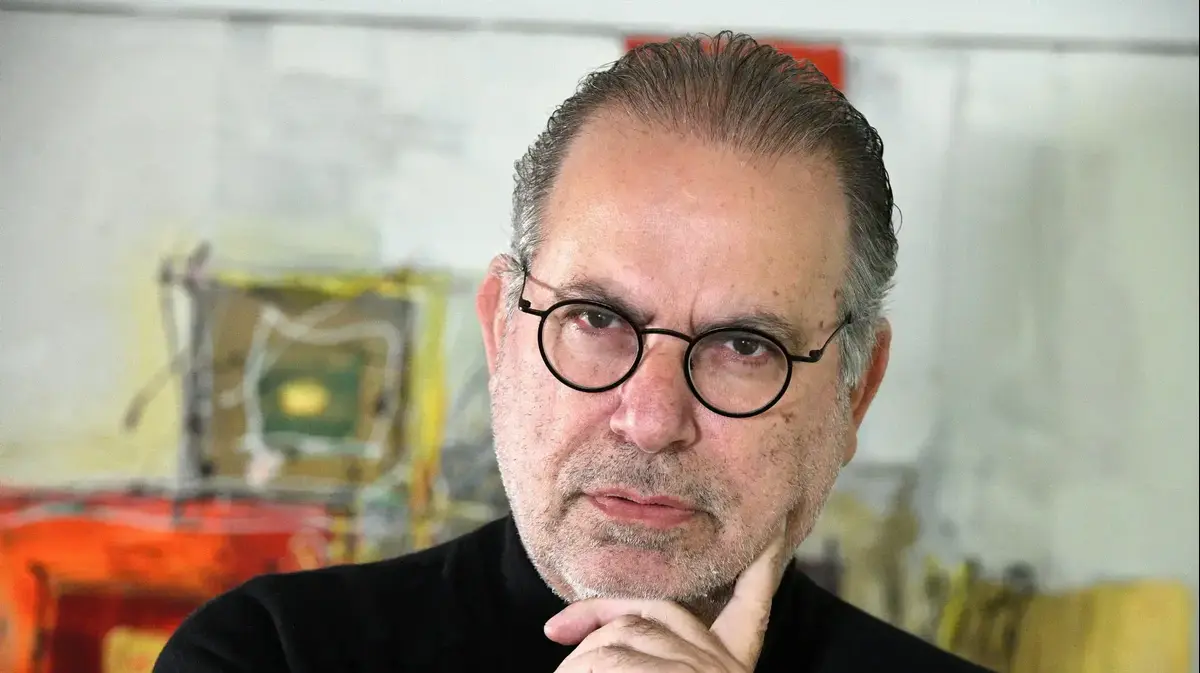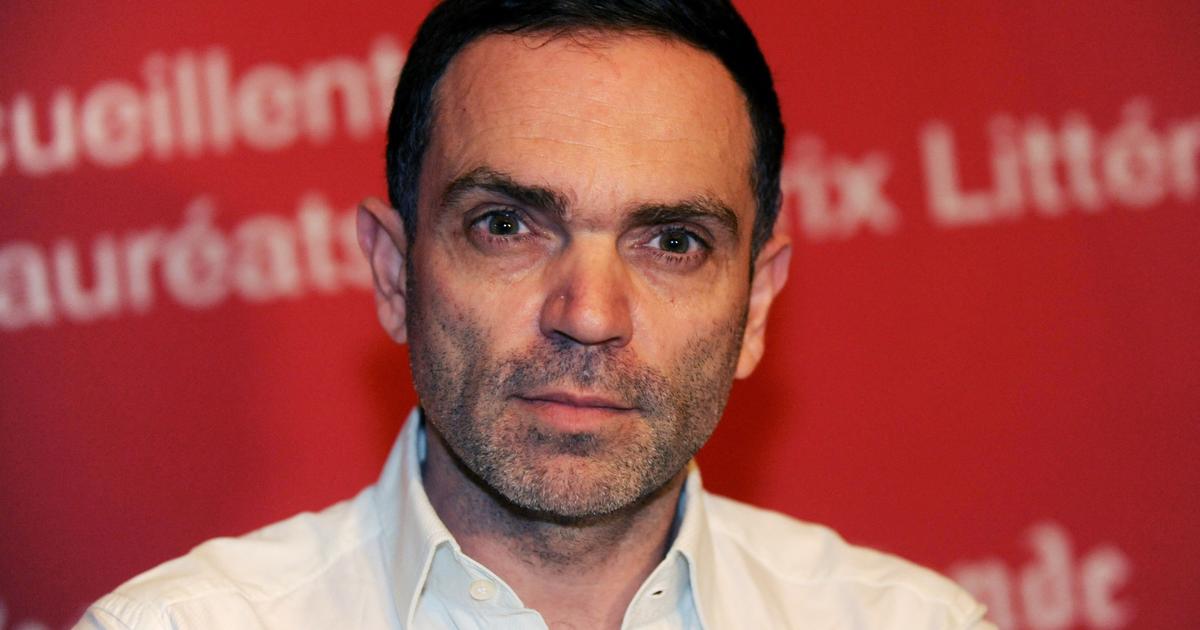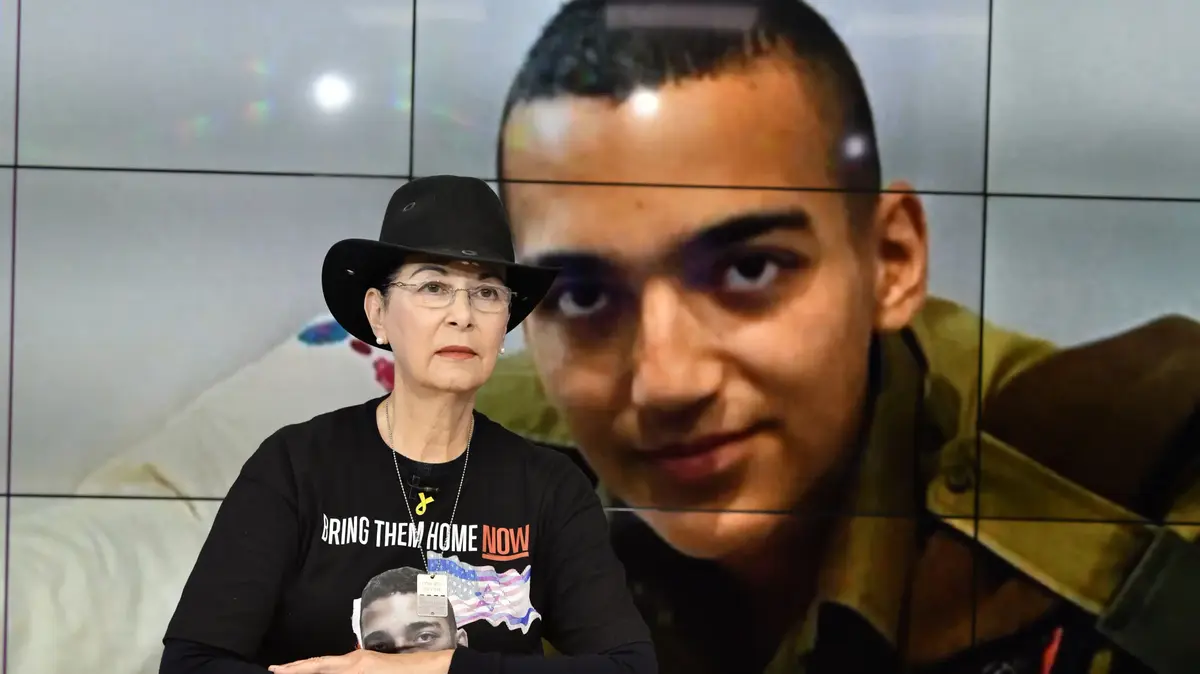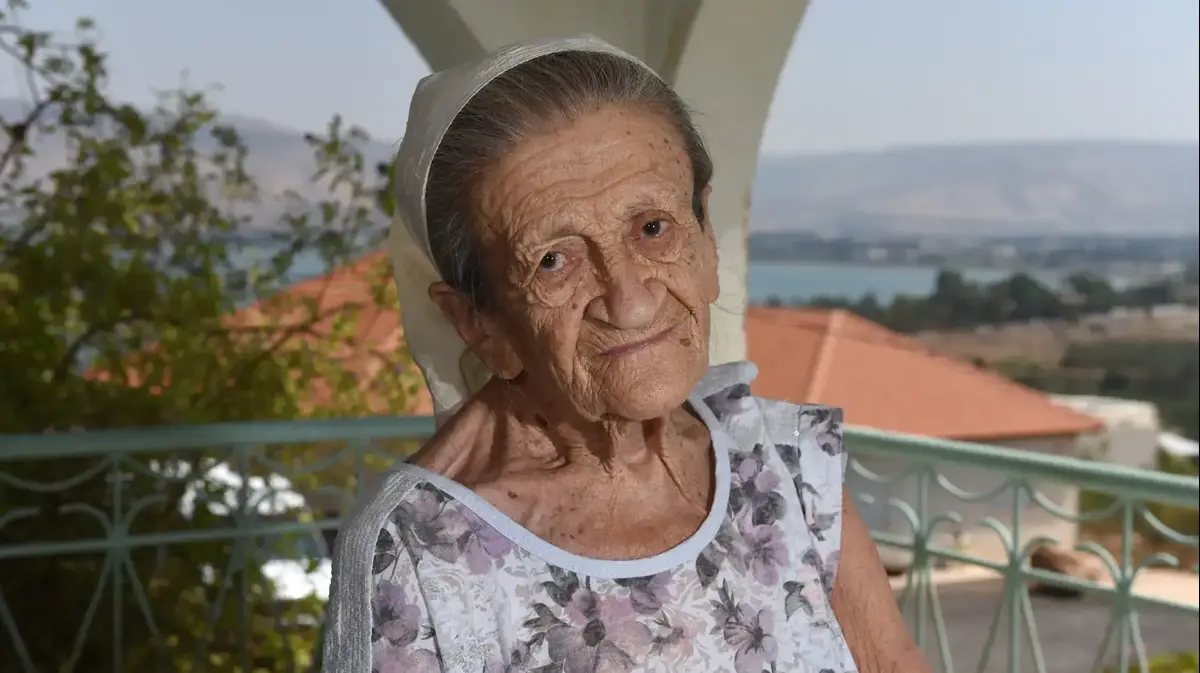Nathan Datner: "In my imagination I seated the parents in the second row and saw them proud of their son"
The cruelty and dangers of the profession ("can make you a crazy hubris"), the impact of Mi-Tu on the theater ("that stores will never move today"), the possibility of a reunion with Avi Kushnir and the impact of exposing Yehuda Nahari on the show starring him.
Nathan Datner in an interview in honor of his new play, "A Thousand Thorns"
Sagi Ben Nun
24/03/2022
Thursday, 24 March 2022, 17:00 Updated: 17:04
Share on Facebook
Share on WhatsApp
Share on Twitter
Share on Email
Share on general
Comments
Comments
Trailer for the play "A Thousand Thorns" by the Goshen Theater, which deals with the world of cults.
Directed by Natan Datner, written by Guy Hirsch and Eyal Heine Gali, and starring Yehuda Nahari, Odia Yaron, Maureen Amor and Anat Pedershneider (Tami Shaham, Goshen Theater)
At the beginning of Natan Datner's professional career, he is cast in his first major role - Scapino in a play of the same name at the Be'er Sheva Theater, an adaptation of Moliere's play "Skeptic Pranks".
The show was a huge success and there was a moment when Datner got confused and blinded by it.
"The show became a crazy lager. I was at the beginning of my career, and I probably felt very good and very strong," he says in an interview with Walla!
culture.
"I was the lead role and it was clear that all the success of the evening was because of me. And probably in an ego trip I would have found myself because of a quarrel or something to say to one of the actresses: 'With you in life I do not stand on stage.' Say. From that moment on, and I say this at the height of innocence and honesty, I've never tried in my life to get into this situation. Because this profession can at certain moments make you crazy hubris. I found myself touching this hubris several times. "And I kept trying to remember the mistake I made then. Because I insulted it and it was an idiotic sentence."
This glare was on the episode again decades later, when he starred in the lead role in the Cameri's musical “Fiddler on the Roof”.
"I remember that at the end of the musical I got up to bow, the audience got to their feet, and the actress Anat Waxman, who is a friend, came to me. She was behind the scenes and as I came out she said: 'Very quickly a psychologist, to treat the day after.'
And you went to a psychologist for Waxman's advice?
"No. It amused me. Because I knew exactly what it meant. That everything is temporary. And as clichéd as it may sound, after the crowd gets to their feet, you get off the parking lot, you're alone, get in the car, drive home, late at night. Everyone's already asleep. And you're already asleep. Alone with yourself. So how many hubris can you already have? You know, we are not pop stars, we are not oriental singer stars, we have no fans in the profession in this respect. When we were idlers I touched those moments of admiration. There were fans near my house. Neighbors poured water on them Because they made a noise. It's much more amusing me and Kushnir. I mean, as a theater actor you realize how much it can be a lie. "With all your success?" "So you know where you are.
Do not be blinded.
Nathan Datner (Photo: Reuven Castro)
Datner's candidness was watched in an interview with him, after raising the issue of actors' challenging confrontation with an sometimes excessive ego, and the narcissistic element that artists have that sometimes threatens to hurt them.
This follows our conversation about a character with extreme narcissism of a cult leader, who is at the center of a new play directed by Datner, "A Thousand Thorns" by the Goshen Theater, which deals with the world of cults, with Yehuda Nahari and Odia Yaron in the lead roles.
The show combines the point of view of a girl drifting after a charismatic leader, alongside her mother’s confrontation with her daughter’s steps.
The play, written by Guy Hirsch and Eyal is Gali, examines what causes a person to surrender to another in a total way, sometimes to the point of losing his personality, how easy it is for a person to lose himself in the pursuit of false ideas and how difficult the way back can be.
The premiere will take place on Sunday (March 27) at the Eretz Israel Museum, and on April 19, the play will take place at the International Festival of Children and Youth.
The main star of the show is the actor Yehuda Nahari.
"I really like Yehuda," says Datner, "I believed in Yehuda very much and that's why I chose him. In the auditions I discovered some charisma and sex appeal in him. "They followed me, a beautiful guy, saying beautiful things, singing, playing, lighting. Yehuda turned out to be a very, very sensitive man. He had crises at work, but I believed in him all the way and encouraged him."
More on Walla!
"Suddenly Asi Ezer pulled out the organ. 'Doesn't that excite you?', He asked. 'Try, what do you care?'"
To the full article
"I decided to celebrate every round birthday."
Nathan Datner (Photo: Reuven Castro)
In early January, Nahari revealed in an interview with the author of these lines in Walla!
A culture of sexual harassment and an indecent act he said he experienced about a decade ago, when he was invited by TV personality and creator Asi Ezer to his home in Tel Aviv to explore the possibility of the band for the series "Being With Her."
During the meeting, which was supposed to be professional, Azer claimed he sexually harassed him and committed an indecent act of removing his penis, although Nahari made it clear to him that he was not interested in an intimate, romantic or sexual relationship, and ignoring his repeated requests that he stop.
Nahari complained to the police a little over a year ago about the harassment, but his complaint was closed due to statute of limitations.
It was sent by Walla!
For a polygraph test and found to be 100 percent truthful.
Following the affair, Nahari launched a campaign called "Men2", which fought sexual assault.
While an affair broke out in Walla!
You worked with Nahari on the show.
"I found out that Judah is a very, very sensitive man. So, I admit it surprised me, because usually such sensitive people tend to be introverted and not publish things. The real story is his. "For a struggle that he strongly believes in. I really hope that at the end of the day his reward will come out of his labor. Because he is fighting with great forces. I have no doubt that it is not easy."
Fighting with great forces.
Yehuda Nahari (Photo: Reuven Castro)
His testimony required great courage.
"Obviously it is a brave move. But there is in this word, brave, that raises the question: not to testify is a weakness? It is sad that to testify today it takes courage. Judah went with his integrity. He went with his believing self towards himself, towards who he is and what he is. He probably could no longer live with this thing, with himself alone, and he did what he did. "
Judah said - all I want is Assi to say sorry to me.
It did not happen.
"Do not be naive, others (about whom testimonies have been published alleging harassment - SB) who have apologized - are paying a price now.
It could be a temporary price.
They were isolated in the industry.
Apparently if you say sorry, you must pay the price.
You can not say sorry and continue to guide 'Ninja'.
So the tactic was - let's not say sorry, let's say it was not. "
To what extent has Mi-Tu made the industry a less violent and exploitative place?
"Certainly we're less violent in the world following Mi-Tu. I can tell you I touched all sorts of substances that were once lager, and they asked me: maybe you want to do that now too? Then I read, and I said, I can understand why it was lager, but This humor or these texts do not pass today. It is impossible today to go on stage with such texts, which want a woman, see her as a provocative sexual model and nothing more. Can not raise them, or change if possible. Things have changed. Every extreme has the extreme opposite, this is how battles are fought. Who-to is of extremism to make a correction. And it's great and it's wonderful and that's how it should be and that's fine. In short, I For Mi-Tu. "
More on Walla!
Avi Kushnir is already 60 years old, and it's mostly good for him to play in the sandbox with his friends for "This is it"
To the full article
Only six and a half years after coming down from the chamber "Fiddler on the Roof," in which Datner played Tuvia the Milkman, he will return to the role in June in a remake of the musical at the Hebrew Theater, which he will also direct.
Alongside him, Sandra Sadeh will play Golda, and Nira Rabinovich will also participate in the musical as Neta the matchmaker.
You are not afraid to stand in the shadow of the previous version of "Fiddler on the Roof"?
What will you actually renew, a few years after the previous version was downloaded?
"It all comes from somewhere else. It does not come from a place of innovation. There are things whose very existence and doing is the novelty. I must remind you that 'Fiddler on the Roof' came up after decades of not being shown, because there was a different atmosphere about this musical, Thought his material was too exiled.The previous production removed this obstacle in a big way.It's a kind of productions that are much more than just artistic making, it's a kind of mission, that's how I see it.
"The previous production was very big, and we are trying to make a production that will do two things: it will also be big, and at some point we can reduce it to travel wherever possible in the country, that everyone will see it. Because it did not reach the districts. "That the phenomenon that was in the previous production, that families came several times, every time someone brought someone else, to make their time pleasant and get rich with this wonderful material, will happen to us as well. I admit that I am very excited."
But there is no fear of "milking" Tuvia the milkman again, and that they will click that you are recycling?
"No. It's a classic. It's like no one chirps when you do 'Hamlet' and 'Romeo and Juliet' again. It is considered a classic material to me. "It's a statement that solves the whole thing, and tells you exactly what it's about. Beyond the fact that I'm directing this time, what I did not do last time."
Which other role did you want to return to, and which role would you by no means agree to return to?
"It's the kind of thing I do not deal with, the kind of questions that should not be entered into. When you look back on a career, you see that every age has its excellent role, that sometimes you get to it and sometimes you don't get to it. For example the 'rebellious training' I did It's also one of the most spectacular roles I've had, much to my delight, and it's the kind of role I can no longer do today. This profession is very cruel in that respect. There are things you can not do anymore because of age. "Very big. I'll soon be too old to do this role. Something in this role that connects my childhood, my history, my family, my essence - I treat it as a gift, that despite the time I got the opportunity to do it again" .
Present.
Nathan Datner in an earlier version of "Fiddler on the Roof" of the Cameri Theater (Photo: Efrat Kafri)
More about the cruelty of the profession: A few years ago, when you were 60, Habima wanted you for the role of policeman Jaber in "Poor Life" but world rights holders objected because of your age and wanted a 40-year-old actor.
"True. I did not want to make Jaber so I said, I do not like this role so much, but at the same time I did 'Mrs. Nava', and they told me, come on, do yourself a favor, we really want you to do Jaber. And this profession is also give and take and relationships, so I said , Come on, okay, 50 plays I'm willing to do Jaber, even though I think this role is a bit forced to do good. And here, I did not want to do, they wanted me to do, and in the end I got a boom in my head. I wanted, so what do you want from my life ?! You both insulted me and dumped me! (Laughs) So you see that this profession is surprising from every direction. It."Today the audience does not eat these things, there is nothing to do."
What do you regret?
"I'm sorry I did not sing more. And I am now recording new songs."
Is there a chance for a union with Kushnir?
"Yes, but in a new song, not a performance of 'Hoppa Hula'."
Next weekend will mark the 35th anniversary of Datner's Eurovision appearance with Avi Kushnir as the pair of idlers with the song "Hoppa Hula".
It's amusing to recall the objections there were to the comic song.
The then Minister of Science, Gideon Pat, said: "This joke will not bring us honor."
And Zvika Pick told Yedioth Ahronoth: "With all due respect to the songwriters, this is not a song. This is not what should go to Belgium. Such entertainers put in a ridiculous light all the singers who come to sing seriously and compete."
I remind Datner of the criticisms and he says: "At that time it was not funny. Minister Fat raised a query in the Knesset. If she had received encouragement they might not have sent us. In the end they did not take this query seriously.
More on Walla!
Nathan Datner: "If someone rings the phone during a show - I can shoot it"
To the full article
"Everyone involved in this matter received money."
Natan Datner in the form of the cat Mill alongside Itai Levy in an advertisement for an insurance company (Photo: Clal Insurance)
Did you like Kushnir and Gidi Gov's version of "The Separatists' Song" in "This Is It" recently, by the way Russia's invasion of Ukraine?
"Sure. It was amazing. It was cool. Look what it is, how the song lived after so many years."
The European Broadcasting Union ousted Russia from the competition, after initially trying to avoid it on the grounds that it was not political.
Is it even possible to detach art from politics, when it comes to an event of this magnitude of Russian invasion of Ukraine?
"Listen, a lot of times they've tried in an artistic way to make things at Eurovision look like bonbonniere. But Eurovision is a political thing."
Appearance with your character the cat Mill, from the mythological show of the same name, in an advertisement for an insurance company.
There have been criticisms in the media about the sale of the rights to use the cultural assets of public broadcasting for commercial advertisements - as has been done with characters from "Kashkashta", "Nice Butterfly" and these days with "Kupa Rashit".
The Seventh Eye also claims that the corporation did not formulate an orderly procedure for commercializing a television work.
What do you think about it?
"They were paid a lot of money, they got rights. Everyone who was involved in this matter got money, from the mask maker, through the songwriter and the public broadcasting corporation. And like every artist gives his face to a bank or something. I guess if he turned to a rat poison factory they might not have Approve a campaign. For a huge insurance company I think it's fine, and I think the commercials paid homage to the character of the cat. "I initiated at the time. So okay, I benefited from that too, it was great."
Sect danger.
Yehuda Nahari and Odia Yaron in the play "A Thousand Thorns" by the Goshen Theater, directed by Natan Datner (Photo: Goshen Theater)
In a month, Holocaust Remembrance Day will be celebrated.
How much did the fact that both of your parents were Holocaust survivors shape you?
"When I was a child I said: I understand what the Holocaust is, what do you mean heroism? I was told: partisans, Warsaw ghetto, etc. Later I realized that this answer is not entirely correct. The correct answer is that heroism is my parents or people like my parents, who after hell they are Pass, and hell is a little word, and after the greatest disaster in world history, immigrate with nothing to a country not theirs, weather not theirs, language not theirs, no work, and raise families to glory.This was my parents' heroism.
"The biggest sadness is that closing the most beautiful circle my parents could have had was sitting in a hall in Tel Aviv and watching their son do 'Fiddler on the Roof' and the audience stood up and applauded. This musical is stories of Shalom Aleichem, stories of Judaism that my parents came from. "
You were the director of the Be'er Sheva Theater. The criticisms of you began even before you took the position and they protested the lack of managerial experience on your part, continued throughout the years you held the position and even after you resigned, criticizing the repertoire you led.
"I do not want to comment on the criticism. When I transferred the theater to Shmulik Yifrach I said: I wish I would accept the theater I give. The theater I received was almost closing, and I gave the keys to the theater that brought back the subscribers and brought repertoire. It was not easy. It was very difficult. My personal reputation on this theater fence. For that they also brought me there. It's true that managerial experience was an acquired thing. What is managerial experience? You have to start somewhere. Today I can say that I have managerial experience. But how will you gain managerial experience if not Start something sometime.
"But it's not the personal. The personal is that I'm very proud of what I did at the Be'er Sheva Theater. I think it was one of my most beautiful episodes of my life that I'm more proud of. "At the Be'er Sheva Theater as a young actor, I saw that my job was to give a stage to young and new forces. Everything else is a flower."
More on Walla!
"A mess that does not deserve a democratic state": Nathan Datner responds for the first time to Miri Regev's storm
To the full article
"The more I ate, the more I ate it."
Nathan Datner (Photo: Reuven Castro)
Yesterday (Thursday), the Habima launch event was held as a municipal corporation of the Tel Aviv Municipality.
It reminded me of the huge debts that the theater had for the creators, and you were among the biggest victims financially - the theater owes you hundreds of thousands, which you will no longer see.
Sucks?
"Habima's debt to me is NIS 360,000.
Reached a kind of creditors arrangement with the court that only about 10-20 percent of the debt will be distributed over ten years.
In short, the money went.
The last thing you expect from a so-called national theater is that it will not live up to its commitment.
When I, an Israeli citizen, work at the National Theater of Israel, I do not believe that I am being worked on.
So when they asked for a little deferral of the payment, I parganed, because I said, this is the National Theater so let's parganan.
The more I ate, the more I ate it.
But I am happy to say that the Ministry of Culture and the Rabinovich Foundation managed to compensate some of the debtors a few tens of thousands of shekels, compared to the hundreds of thousands of shekels they owe me.
So people make an effort.
The municipal corporation is a new entity that has been set up to prevent the matter from happening again with this theater, so I wish it great success.
I think it's a great move. "
As a senior actor and former theater director, what do you think about the proliferation during this period in adaptations made to films in Israeli theater, musicals and dramas, which to some extent comes at the expense of new original works?
"It's an interesting question as to why this happens. It starts with craving original material, not only in the world of theater but also in television and film. In the market. There are excellent directors, there are excellent actors, there are excellent sets, everything is there. People who write good materials are very difficult to find. It is easier today to sell a brand that has already proven itself elsewhere. So go to the world of cinema. The latter, who created a great many beautiful films and screenplays.
"The problem usually, when you put things like that on stage, is the justification. Beyond the fact that a certain film has a good story, you also need justification for putting it on stage. When that question is not answered correctly, there have also been some failures in these transitions. To the theater it is to turn it into a musical. Then you have a reason to actually take 'Zero in Human Relations' or 'Givat Halfon'. To make them an Israeli musical, and come to a savior. "Attracting an audience. So I very much understand that attitude. But if it closes and stops from real original materials to get to the theater - it's a shame."
"We are in a less violent world following Mi-Tu."
Nathan Datner (Photo: Reuven Castro)
And back to the matter of time.
A moment before at age 66, how much does the passing of time bother you?
"When I come to funerals I hear what wonderful obituaries there are for the people who bury them. And I say - if the deceased knew how many speak for him, maybe he would not have died so quickly. So from the age of 60 I decided that every birthday I would have a party for myself, I would put people on stage, who would say how much they love me and how wonderful a person I am. "
What will be written on your tombstone?
"He did his best but did not always succeed."
If I'm not mistaken, Tommy Lapid asked that a similar thing be written on his grave.
"He asked them to write 'did his best' but without what I added, 'but did not always succeed'."
culture
in what
theater
Tags
Nathan Datner
Yehuda Nahari
Fiddler on the Roof
Eurovision
Avi Kushnir
Cults
The cat Mill
Beer Sheva Theater







/cloudfront-eu-central-1.images.arcpublishing.com/prisa/3HRR2JWD2RHM3LA7C5552NJYKM.jpg)







